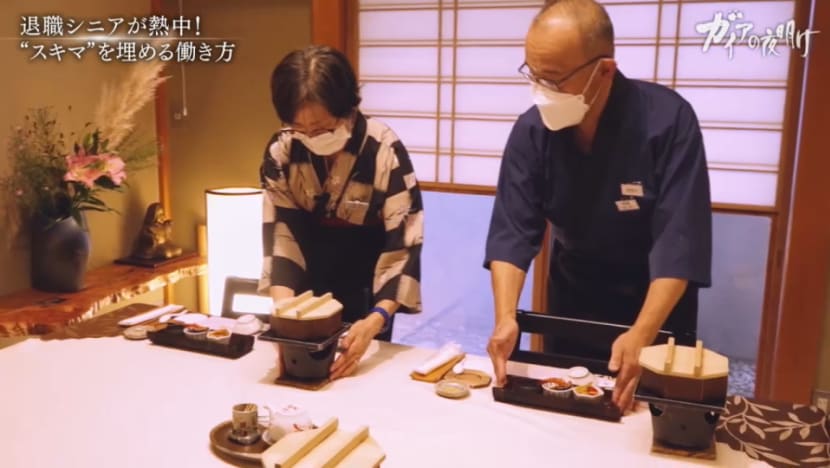Gaia Series 74: A New Era of Exploiting Gaps
In this episode, we explore how Japan’s spot working revolution is reshaping the way people work, addressing labour shortages and helping individuals rediscover purpose in employment.


This audio is generated by an AI tool.
This week, we see how the gig economy, or spot working, is transforming Japan’s labour market, offering flexibility and new opportunities.
The rise of the gig economy, or spot working as it is known in Japan, signals a dramatic shift in how people engage with employment. Against a backdrop of labour shortages and evolving values surrounding work, platforms like Timee are pioneering a flexible, on-demand workforce that offers opportunities for individuals from all walks of life.
In Kanagawa’s Fujisawa City, 61-year-old Masanori Tanaka exemplifies this movement. A former bank salesman, Tanaka retired at 56, confident in his financial stability. Initially enjoying a leisurely life filled with hobbies, his routine was disrupted by the COVID-19 pandemic. “If I kept doing the same thing every day, I thought I’d go crazy,” he reflects. That’s when he discovered Timee, a spot working app allowing individuals to work short-term shifts without traditional hiring procedures like interviews or CV submissions.
Tanaka has embraced this new work style with enthusiasm. Over four years, he’s completed over 1,100 shifts, logging nearly 6,000 hours across 200 companies. His roles have ranged from traffic control during the Tokyo Olympics torch relay to serving in local restaurants. “My income isn’t what it was, but the experiences are priceless,” he says. Spot working has filled his days with purpose and novelty, an antidote to the monotony of retirement.
The appeal of spot working extends beyond retirees. In Shinjuku, Tokyo, 62-year-old Naoko Miyano, a housewife, found herself thriving as a spot worker at a bustling izakaya. Recognised for her proactive approach and impeccable customer service, she’s worked more than 60 shifts at the restaurant. Her manager, Sho Ueno, praises her reliability: “She finds tasks and handles them without being told. She’s indispensable.” Miyano was even awarded the restaurant’s MVP title during its anniversary celebration.
For Miyano, spot working offered more than financial benefits; it rekindled her passion for customer service and inspired her to dream big. “This customer-facing job saved my life,” she shares. Now, she aspires to become a hospitality consultant, teaching others the skills she’s honed. Her journey illustrates how spot working can provide not just a paycheck but a renewed sense of identity.
At the heart of this transformation is Timee, a platform boasting nine million registered users and generating an annual turnover of ¥16.1 billion (S$141 million). CEO Ryo Ogawa, 27, launched the platform in 2018, motivated by his experiences as a part-time worker. “People have free time, and if we use that to help others, we feel satisfied,” he explains. Timee’s innovative badge system, which rewards workers with higher wages for positive employer feedback, aims to enhance both worker quality and earnings.
In sectors such as logistics which the government recently set a limit on working hours, and the nursing industry which faces a chronic shortage of workers, spot working has helped fill up the gaps.
Yet, challenges remain. Businesses grappling with rising labour costs are cautious about adopting premium wages for badged workers. At a luxury Chinese restaurant in Saitama’s Royal Pines Hotel, management trialled hiring only badged workers at a higher rate. The results were promising, with 19-year-old Ms Suzuki excelling in her role despite the added expense. “She’s experienced and capable—worth every yen,” noted the deputy manager. However, not all businesses are convinced, highlighting the delicate balance between affordability and quality.
Beyond short-term gigs, spot working also serves as a gateway to permanent employment. Chiho Kikuchi, a former supermarket employee, leveraged her spot working experiences to secure a managerial role at a luxury hotel in Wakayama. “I want to become an executive in three years,” she declares. Kikuchi’s story underscores spot working’s potential to help individuals transition into fulfilling careers.
Despite its success, spot working raises questions about the long-term impact on Japan’s labour market. Critics draw parallels to the dispatch worker system, which left many in precarious positions during economic downturns. Ogawa acknowledges these concerns: “We don’t want our platform to negatively impact society. We must protect our values and ensure workers thrive.”
Spot working’s rise also aligns with broader societal shifts. The recent minimum wage hike to ¥1,055, the largest in Japan’s history, underscores the urgent need for fair compensation. Platforms like Timee advocate for a baseline ¥200 increase above minimum wage for experienced workers, but convincing businesses to invest in quality labour remains an uphill battle.
As Japan navigates these challenges, this spot working phenomenon offers a glimpse into a future where work is more adaptable and inclusive. Whether it’s retirees like Tanaka finding purpose, housewives like Miyano discovering dreams, or individuals like Kikuchi building new careers, this emerging model reshapes not only livelihoods but lives.
In the words of Timee’s Ogawa, “Beyond these changes and challenges, there must be a happier way of working awaiting both companies and workers.” The journey towards that future has only just begun.












